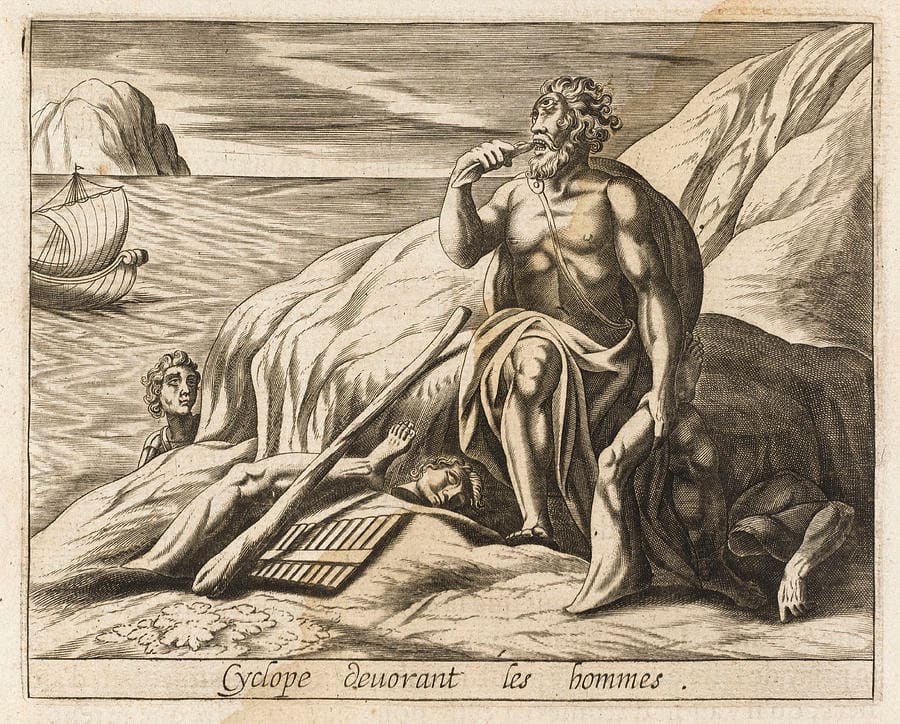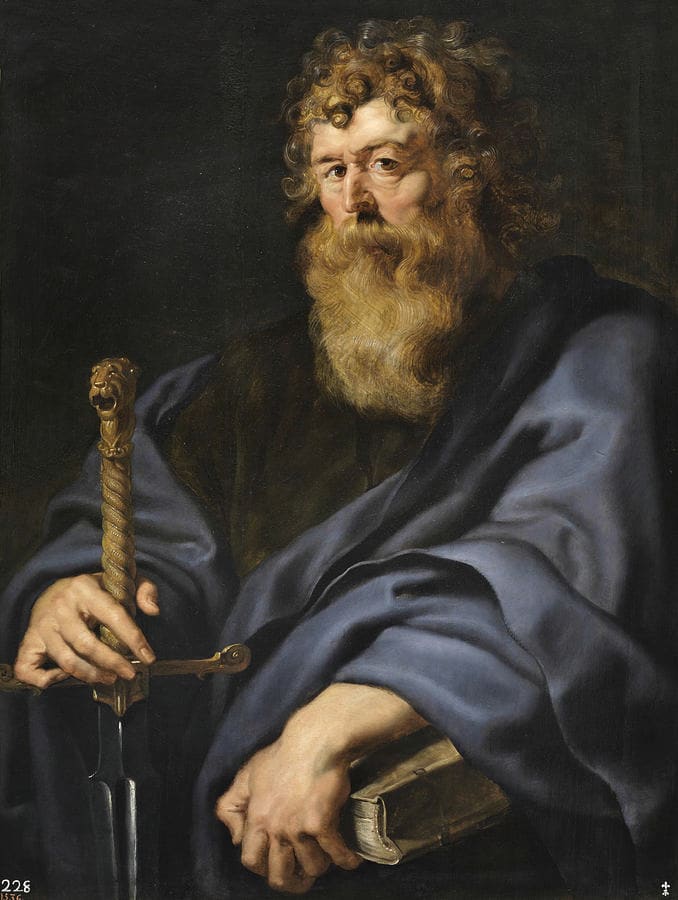One of the things that fascinates me in biblical research is the numerous points of contact between the biblical text and literature from the cultures surrounding ancient Israel. Because I am an Old Testament scholar, that usually means literature from places like Ugarit, Sumer, and Babylon. But I love Greek stuff, too, and a passage I found in Euripides’s Cyclops has really excited me.
Cyclops is the only satyr play that we have in its entirety. Satyr plays seem to have developed from ritual enactments of stories of Bacchus that were a part of the annual Dionysian festivals. They are a strange hybrid of tragedy and raucous, raunchy comedy, with the chorus taking the part of sexually voracious satyrs in ridiculous costumes that over-emphasized a certain part of the male anatomy. Cyclops is still as funny as it was when it was presented two and a half millennia ago. Part of the genius of the play is that it draws together two beloved stories, Odysseus’s adventures with the cyclops Polyphemus, and Bacchus’s abduction by pirates. In Cyclops, Bacchus’s old companion, Silenus, and all of the satyrs, have gone looking for Bacchus, and gotten themselves enslaved by Polyphemus on Mt. Etna, working as shepherds for his famed flocks of giant sheep. Most of the humor occurs in the conversation between Silenus and Odysseus, which culminates in Silenus excitedly getting drunk on wine that Odysseus uses to purchase some food for his men.
When Polyphemus does show up, the humor, though more grisly and dark, persists for a while. Silenus protests that he did not give Odysseus and his men a sheep and cheese from Polyphemus’s stores, but that they beat him up and plundered them, and appeals to his cheeks, swollen and ruddy with wine, as evidence of their violence.
And then, suddenly the play is shot through with grim terror. Listen to Odysseus describe the horrific scene to one of the satyrs:
Now when that hell-cook, god-detested, had everything quite ready, he caught up a pair of my companions and proceeded deliberately to cut the throat of one of them over the yawning brazen pot; but the other he clutched by the tendon of his heel, and, striking him against a sharp point of rocky stone, dashed out his brains; then, after hacking the fleshy parts with glutton cleaver, he set to grilling them, but the limbs he threw into his cauldron to seethe. And I, poor wretch, drew near with streaming eyes and waited on the Cyclops; but the others kept cowering like frightened birds in crannies of the rock, and the blood forsook their skin.
From the translation of E. P. Coleridge

Euripides’s most powerful lines in the play are reserved for Polyphemus, in my opinion. Polyphemus had already become an established symbol of crimes against hospitality. But Euripides digs deeper, and attributes Polyphemus’s cruelty to a more fundamental character flaw, impiety.
Polyphemus declares his independence from the gods immediately after Odysseus attempts to appeal to a sense of piety and justice that he supposes is universal among intelligent spirits. His blasphemies are shocking, and extend even to his father, Poseidon!
Plague take the headlands by the sea, on which my father seats himself! Why hast thou put forward these arguments? I shudder not at Zeus’s thunder, nor know I wherein Zeus is a mightier god than I, stranger; what is more, I reck not of him; my reasons hear. When he pours down the rain from above, here in this rock in quarters snug, feasting on roast calf’s flesh or some wild game and moistening well my up-turned paunch with deep draughts from a tub of milk, I rival the thunder-claps of Zeus with my artillery; and when the north wind blows from Thrace and sheddeth snow, I wrap my carcase in the hides of beasts and light a fire, and what care I for snow? The earth perforce, whether she like it or not, produces grass and fattens my flocks, which I sacrifice to no one save myself and this belly, the greatest of deities; but to the gods, not I! For surely to eat and drink one’s fill from day to day and give oneself no grief at all, this is the king of gods for your wise man, but lawgivers go hang, chequering, as they do, the life of man! And so I will not cease from indulging myself by devouring thee; and thou shalt receive this stranger’s gift, that I may be free of blame,-fire and my father’s element yonder, and a cauldron to hold thy flesh and boil it nicely in collops. So in with you, that ye may feast me well, standing round the altar to honour the cavern’s god.
St. Paul, the Philippians, and Polyphemus
Paul makes an obvious allusion to Euripides’s Cyclops in Philippians 3:19.
Their end is destruction, their god is the belly, and they glory in their shame, with minds set on earthly things.
Philippians 3:19, RSV
Paul seems to assume that his audience will be familiar with this play. Philippi does boast of an ancient theater, which is still used for performances today.

Paul’s description of the “enemies of the cross of Christ” (vs. 18) maps nicely on to Euripides’s Polyphemus. In the play, Polyphemus gets drunk on Odysseus’s wine, and is immediately transformed into a sexual deviant who “glories in his shame.” (Specifically, he attempts to rape Silenus; this is, for the most part, played for laughs). Of course, Polyphemus’s speech above amply demonstrates that his “mind is set on earthly things.” The result is the destruction of his eye, and, it is implied, his eventual and ultimate demise that follows his blindness.
Taking this into consideration gives Paul’s words in Philippians 3 considerably more “pop.” He seems to be saying more than that the opponents of the Gospel are carnal gluttons. Rather, with a twinkle in his eye, he’s depicting them as cannibalistic, blasphemous monsters a la Polyphemus. His use of pagan literature to skewer pagan culture in this manner is deliciously subversive. Conversely, the Christian faithful who now find themselves in numerous predicaments plotted for them by their cyclopean neighbors are on a spiritual odyssey towards their authentic homeland. After all, “our commonwealth is in heaven,” (vs. 20).
So, on the one hand, there is a parallel between the Christian believer and Odysseus: both heroes are far from home and beset with vicious, predatory villains who blaspheme the heavens with their single-minded pursuits of pleasure. On the other hand, the Christian’s hope is not in her wits, but in her Savior: “from [heaven] we await a Savior, the Lord Jesus Christ” (vs. 20). The drama of the Christian life, in the end, features a deus ex machina. Just when all seems hopeless, we trust that Jesus will swoop down from the heavens to rescue His just ones, and to condemn the wicked.
Paul’s Eclecticism

In conclusion, once again I find myself awed by Paul’s erudition. We all know of his command of the Old Testament scriptures. His Pharisaic education accounts for his seemingly effortless ability to generate midrashic exegesis in ways that bump right up against the material in Mekhilta d’ Rabbi Yishmael or the Talmuds, compiled centuries later. But somewhere, he seems to have read classical Greek, pagan literature, and become so familiar with it that he can invoke it with great power. This doesn’t fit the stereotype of Pharisaic cultural engagement in the first century. Surely, Paul’s citation of pagan sources deserves more attention than it has yet received, if for nothing else than it might help Christians think through our engagement with our own culture.

